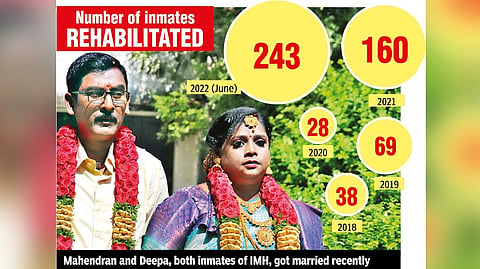

CHENNAI: A mental illness, in any form, comes with stigma. Seen as a sign of weakness, karmic imbalance, and attention-seeking behaviour, mental health is often perceived with disdain and an afterthought.
Though public discourse around it has improved somewhat, it’s still theoretical with discussions and debates ‘othering’ the problem, making societal acceptance a fool’s dream.
Which is why the marriage of two inmates – Mahendran and Deepa – from the Institute of Mental Health was celebrated by media channels across the State! It’s a story of hope for those struggling with mental health issues, and of course their families, who, more often that not, give up on them and/or refuse to accept them back, even after they’ve been treated and rehabilitated.
Harsh reality is that inmates from the mental health facilities do not return to normalcy easily and have nowhere to go.
Mahendran and Deepa got married in a small ceremony at a temple in the city recently. This is the first time in the history of the Institute of Mental Health that inmates of the hospital have got married. However, not every inmate at the IMH finds the road to recovery easy, much less gets their happy ending.
At least 250 inmates from the IMH have been rehabilitated and reunited with their families. However, many return because families do not accept them or fail to give them the much-needed support. There are several reasons why this happens.
“Of all the patients at IMH, we reunite around 50% percent of them with their families. Yes, the percentage is lower among women,” stated a medical officer at the IMH. “A lot of patients come back saying that their husbands have remarried or are unable to support them. Such uncertainties don’t help with stability which is crucial is preventing a relapse. And since they fear a relapse, they return. In some cases, we do hear of relapses if medications and follow-ups are not done properly.”
Since many mentally ill persons have nowhere to go, IMH places them at the half-way home run by the Chennai corporation. It’s a shelter for those who have recovered but not reunited with family.
Though the number of inmates discharged after treatment from the IMH and reunited with their families has increased since last year (160 were reunited), hospital authorities say that this number is fairly less when compared to the total number of patients being admitted to the institute.
“They start working here at the cafe or the day-care facility and take charge of their own life,” says Dr Poorna Chandrika, director-IMH. “It’s common for people to not accept family-members with a history of mental health issues, even after they’ve been treated. The stigma is very strong. Plus, they think that the person might not be able to work and contribute financially or otherwise at home. We assure families that they can be readmitted if and when there are relapses.”
Visit news.dtnext.in to explore our interactive epaper!
Download the DT Next app for more exciting features!
Click here for iOS
Click here for Android